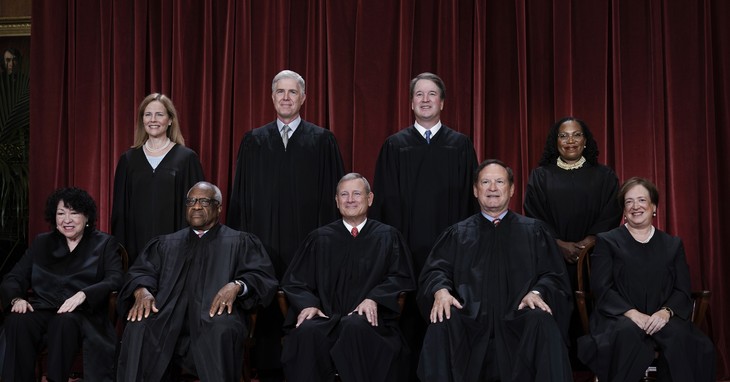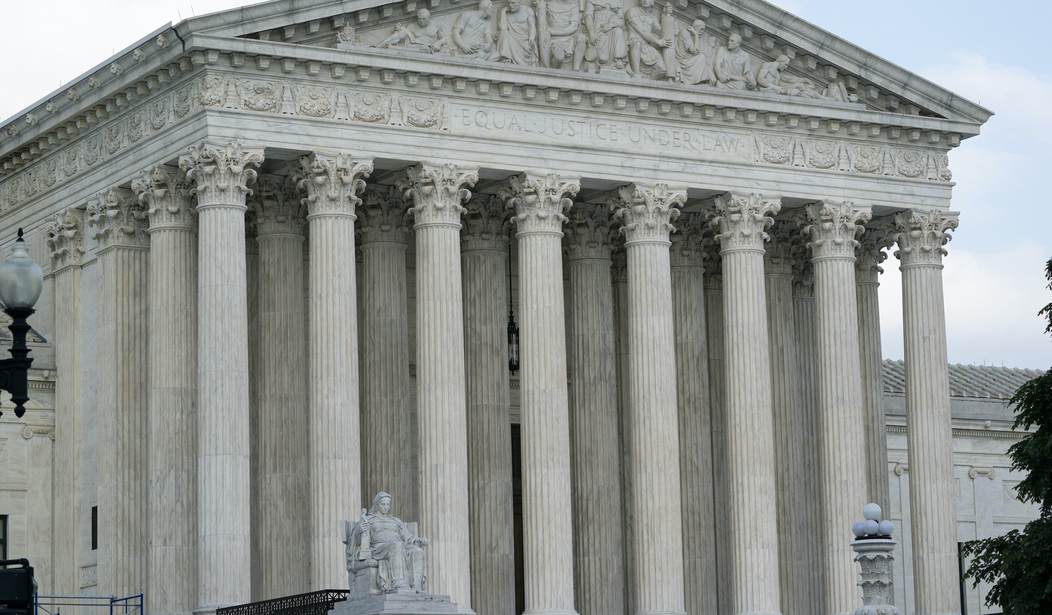As we near the end of Supreme Court Season (the term technically doesn’t end until October, but the court typically recesses in late June or early July after handing down the decisions for that term), I thought it might be helpful to provide a quick rundown or crib sheet on the week’s opinions. While 2022 had several notable decisions, Dobbs v. Jackson Women’s Health Organization was obviously the one that dominated the headlines, both in terms of the leaked decision and the ultimate holding.
By comparison, 2023’s SCOTUS news has seemed a bit tamer. The court was also slow to issue opinions, with some speculating that this may be fallout from last year’s leak and adjustments made to try and guard against a recurrence. By the 1st of May, the court had only released 15 decisions, with 44 more to go. Since then, it’s picked up the pace somewhat. This week, eight decisions were issued, and now ten remain.
This is by no means intended as a thorough analysis — just a quick overview for the non-law-geek sorts:
June 22, 2023 Decisions
Author: Thomas
Split: 6-3
Dissent: Jackson, Kagan, Sotomayor
Appeal From: 8th Circuit
Basic Facts: Marcus Jones, a federal inmate, was convicted in 2000 for two counts of unlawful possession of a firearm by a felon and one count of making false statements to acquire a firearm. He was sentenced to more than 27 years in prison. A 2019 Supreme Court decision held that the statute under which Jones was convicted requires prosecutors to prove that the defendant knew that he was barred from possessing a gun – which the government did not do for Jones. He contended that he believed that his record had been expunged.
Issue: Whether and how Jones can now challenge his detention when federal habeas corpus laws generally prohibit inmates from filing more than one petition for habeas corpus.
Holding: Jones cannot proceed under 28 USC 2241, the general habeas corpus statute. (8th Circuit affirmed.)
Author: Sotomayor
Split: 6-3
Dissent: Alito, Gorsuch, Thomas
Appeal From: 9th Circuit
Basic Facts: Smagin won a multimillion-dollar arbitration award against Yegiazaryan in 2014 over misappropriated investment funds from a Moscow real estate venture. Though both were Russian citizens, Yegiazaryan resided in California, so Smagin filed suit there to enforce the award.
Issue: Whether a foreign plaintiff whose only injury was to intangible property (a court judgment) has suffered the kind of “domestic” injury required to bring a claim under the Racketeer Influenced and Corrupt Organizations Act (RICO).
Holding: A plaintiff alleges a domestic injury for purposes of RICO when the circumstances surrounding the injury indicate it arose in the United States. (9th Circuit affirmed.)
Author: Kavanaugh
Split: 5-4
Dissent: Gorsuch, Jackson, Kagan, Sotomayor
Appeal From: 9th Circuit
Basic Facts: The Navajos filed suit seeking to compel the United States to take affirmative steps to secure needed water for the Tribe pursuant to an 1868 peace treaty between the Tribe and the U.S.—including by assessing the Tribe’s water needs, developing a plan to secure the needed water, and potentially building pipelines, pumps, wells, or other water infrastructure. The States of Arizona, Nevada, and Colorado intervened against the Tribe to protect those States’ interests in water from the Colorado River.
Issue: Whether the treaty obligated the federal government to assess the Tribe’s water needs.
Holding: The treaty at issue does not require the federal government to take the affirmative steps that the Navajo Nation contends. (9th Circuit reversed.)
Author: Kavanaugh
Split: 6-3
Dissent: Gorsuch, Kagan, Sotomayor
Appeal From: 4th Circuit
Basic Facts: In two immigration proceedings, noncitizens Fernando Cordero-Garcia and Jean Francois Pugin were determined removable from the United States on the ground that they had convictions for aggravated felonies—namely, offenses “relating to obstruction of justice.”
Issue: Whether a criminal offense that does not interfere with an existing investigation or judicial proceeding – for example, being an accessory after the fact or discouraging a witness from reporting a crime – qualifies as an “offense relating to obstruction of justice,” which is a serious crime that can result in deportation and additional criminal punishment for noncitizens.
Holding: An offense can “relate to obstruction of justice” for purposes of this statute, even if the offense does not require that an investigation or proceeding is pending. (4th Circuit reversed.)

June 23, 2023 Decisions
Author: Thomas
Split: 6-3
Dissent: Jackson, Kagan, Sotomayor
Appeal From: 2nd Circuit
Basic Facts: Petitioner Adam Samia, along with Joseph Hunter and Carl Stillwell, were arrested by the U. S. Drug Enforcement Administration and charged with a variety of offenses related to the murder-for-hire of Catherine Lee, a real estate broker. The Government tried all three defendants jointly in the Southern District of New York. Prior to trial, the Government moved to admit Stillwell’s postarrest confession in which he admitted that he had been in the van in which Lee was killed, but he claimed that Samia had shot Lee. Since Stillwell would not be testifying on his own behalf and the full confession implicated Samia, the Government proposed that the confession be introduced through the testimony of a DEA agent, who would testify to the content of Stillwell’s confession in a way that eliminated Samia’s name while avoiding any obvious indications of redaction.
Issue: Whether Samia’s Sixth Amendment right to be “confronted with the witnesses against” him was violated by the introduction of Stillwell’s confession that identified Samia as the person who pulled the trigger but which replaced Samia’s name with neutral terms such as the “other person.”
Holding: The Confrontation Clause does not bar the admission of the confession in these circumstances. (2nd Circuit affirmed.)
Author: Kavanaugh
Dissent: Alito
Appeal From: 5th Circuit
The case involved the issuing of new enforcement guidelines by the Department of Homeland Security. After initially attempting to impose a 30-day moratorium on all ICE deportations, the department issued guidance that restricted ICE agents to targeting three types of illegal immigrants for arrest and deportation: recent border crossers; threats to public safety; and national security threats.
“The fact an individual is a removable noncitizen therefore should not alone be the basis of an enforcement action against them,” DHS Secretary Alejandro Mayorkas said in the memo. “We will use our discretion and focus our enforcement resources in a more targeted way. Justice and our country’s well-being require it.”
The department said it was the most efficient use of limited resources to protect the American people, but critics saw it as part of a broader rolling back of enforcement and border security. The imposition of those guidelines coincided with a sharp drop in ICE deportations. In FY 2021, which included the final months of the Trump administration, ICE arrested 74,082 noncitizens and deported 59,011. Of the 74,082 arrests between October 2020 and October 2021, only 47,755 took place after Feb. 18 when the new priorities were implemented. Of removals, just 28,677 of the 59,011 deportations took place after Feb. 18.
Issue: Whether states had standing to challenge the guidelines because they would incur costs due to the administration’s failure to follow the statutory mandates.
Holding: The states do not have standing to challenge the policy. (5th Circuit reversed.)
Author: Kavanaugh
Split: 5-4
Dissent: Jackson, Kagan, Sotomayor, Thomas
Appeal From: 9th Circuit
Basic Facts: Abraham Bielski filed a putative class action on behalf of Coinbase users, alleging that Coinbase, an online currency platform, failed to replace funds fraudulently taken from the users’ accounts. Because Coinbase’s User Agreement provides for dispute resolution through binding arbitration, Coinbase filed a motion to compel arbitration.
Issue: Whether, when a district court denies a motion to compel arbitration, it must put its pretrial and trial proceedings on hold while the appeal of that decision (to which the losing party has a statutory right) is ongoing.
Holding: A district court must stay its proceedings while an interlocutory appeal on the question of arbitrability is ongoing.
Author: Barrett
Split: 7-2
Dissent: Jackson, Sotomayor
Appeal From: 9th Circuit
Basic Facts: Defendant Helaman Hansen ran an “adult adoption” scheme in which he persuaded more than 450 people to pay him a substantial fee, promising – falsely – that in return, they would become U.S. citizens through adoption. Hansen was convicted on fraud charges, but he was also convicted of violating a federal law that makes it a crime to encourage or induce unlawful immigration.
Issue: Whether a federal law that prohibits “encouraging or inducing” illegal immigration violates the First Amendment due to being overly broad.
Holding: Because the law forbids only the purposeful solicitation and facilitation of specific acts known to violate federal law, the clause is not unconstitutionally overbroad.














Join the conversation as a VIP Member